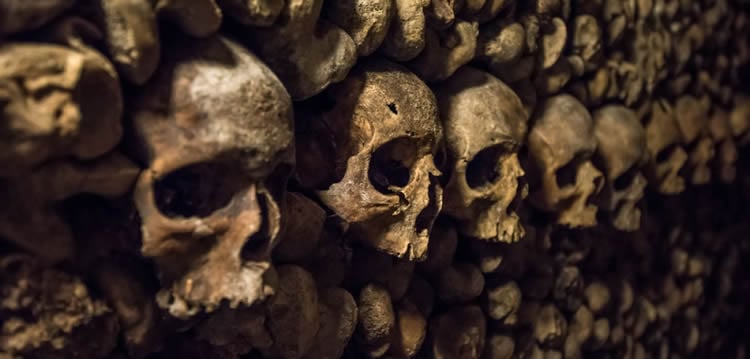Summary: A new study reveals atheists and those who hold very religious beliefs are least afraid of dying.
Source: University of Oxford.
A new study examines all robust, available data on how fearful we are of what happens once we shuffle off this mortal coil. They find that atheists are among those least afraid of dying…and, perhaps not surprisingly, the very religious.
Religion has long been thought to be a solution to the problem of death. Notions of an afterlife are nearly universal, though there is great diversity in the details. Given this close association between religion and death, researchers have long supposed that religion lessens fear about death. It stands to reason that religious believers should be less fearful of death than nonreligious individuals, or does it? A systematic review of high quality international studies led by researchers at the University of Oxford paints a more complicated picture. It shows that the very religious and atheists are the groups who do not fear death as much as much as those in-between in a paper published in the journal, Religion, Brain and Behavior.
‘Meta-analyses are statistical procedures used to extract and combine the findings of multiple studies. This produces a better estimate of the consensus in a field than looking at individual studies,’ explains Dr Jonathan Jong, a Research Associate at the Institute of Cognitive and Evolutionary Anthropology and Research Fellow at Coventry University. Jong led a team of researchers from Oxford, Coventry, Royal Holloway, Gordon College, Melbourne University and Otago University to search systematically for research on the relationship between death anxiety and religious belief.
The team found 100 relevant articles, published between 1961 and 2014, containing information about 26,000 people worldwide. Combining this data, they found that higher levels of religiosity were weakly linked with lower levels of death anxiety. The effects were similar whether they looked at religious beliefs such as belief in God, and an afterlife, or religious behaviour like going to church, and praying.
Some studies also distinguished between intrinsic religiosity and extrinsic religiosity. Extrinsic religiosity is when religious behaviour is motivated by pragmatic considerations such as the social or emotional benefits of following a religion, whereas intrinsic religiosity refers to religious behaviour driven by ‘true belief’. The meta-analysis showed that while people who were intrinsically religious enjoyed lower levels of death anxiety, those who were extrinsically religious revealed higher levels of death anxiety.
The findings were mixed across the studies, with only 30% of the effects showing this finding. Surprisingly, perhaps, 18% of the studies found that religious people were more afraid of death than non-religious people; and over half the research showed no link at all between the fear of death and religiosity. This mixed picture shows that the relationship between religiosity and death anxiety may not be fixed, but may differ from context to context. Most of the studies were conducted in the United States, with a small number carried out in the Middle East and East Asia. This makes it difficult to estimate how the pattern varies from culture to culture, or religion to religion, says the paper.

Based on previous research, the team also checked for curvilinear patterns in the data. Rather than assuming that the religiosity is either positively or negatively related to death anxiety, some researchers have posited that the relationship is like an upside-down U shape, with religious believers and disbelievers showing less death anxiety than people in between. Out of the 100 studies, the team only found 11 studies that were robust enough to test this idea; however, of these, almost all (10) formed this pattern.
Dr Jong commented: ‘It may be that other researchers would have found this inverse-U pattern too if they had looked for it. This definitely complicates the old view, that religious people are less afraid of death than nonreligious people. It may well be that atheism also provides comfort from death, or that people who are just not afraid of death aren’t compelled to seek religion.’
Source: University of Oxford
Image Source: NeuroscienceNews.com image is adapted from the University of Oxford press release.
Original Research: Abstract for “The religious correlates of death anxiety: a systematic review and meta-analysis” by Jonathan Jong, Robert Ross, Tristan Philip, Si-Hua Chang, Naomi Simons & Jamin Halberstadt in Religion, Brain and Behavior. Published online March 16 2017 doi:10.1080/2153599X.2016.1238844
[cbtabs][cbtab title=”MLA”]University of Oxford “Who is Least Afraid of Death?.” NeuroscienceNews. NeuroscienceNews, 24 March 2017.
<https://neurosciencenews.com/death-fear-neuroscience-6290/>.[/cbtab][cbtab title=”APA”]University of Oxford (2017, March 24). Who is Least Afraid of Death?. NeuroscienceNew. Retrieved March 24, 2017 from https://neurosciencenews.com/death-fear-neuroscience-6290/[/cbtab][cbtab title=”Chicago”]University of Oxford “Who is Least Afraid of Death?.” https://neurosciencenews.com/death-fear-neuroscience-6290/ (accessed March 24, 2017).[/cbtab][/cbtabs]
Abstract
The religious correlates of death anxiety: a systematic review and meta-analysis
Various theories of religion hypothesize a connection between death anxiety and religiosity. In particular, Terror Management Theory’s worldview defence hypothesis predicts that death anxiety is lowest among very religious and irreligious individuals, and highest among uncertain individuals. Likewise, the supposition that death anxiety motivates religious belief, which in turn mitigates death anxiety, predicts that religiosity increases with death anxiety among non-believers, and that death anxiety decreases as religiosity increases among believers. In both cases, a curvilinear relationship – specifically, an inverted-U curve – is predicted. We extracted 202 effect sizes from 100 studies for an “omnibus” religiosity meta-analysis, and six meta-analyses that examine particular dimensions of religiosity. We found high heterogeneity and a weak negative association between death anxiety and religiosity. A closer examination revealed that 10 of the 11 studies that directly tested for curvilinearity provided some support for an inverted-U pattern. The curvilinearity hypothesis cannot be ruled out, but more evidence – particularly on non-religious individuals, and in non-Western, non-Abrahamic contexts – is needed.
“The religious correlates of death anxiety: a systematic review and meta-analysis” by Jonathan Jong, Robert Ross, Tristan Philip, Si-Hua Chang, Naomi Simons & Jamin Halberstadt in Religion, Brain and Behavior. Published online March 16 2017 doi:10.1080/2153599X.2016.1238844







